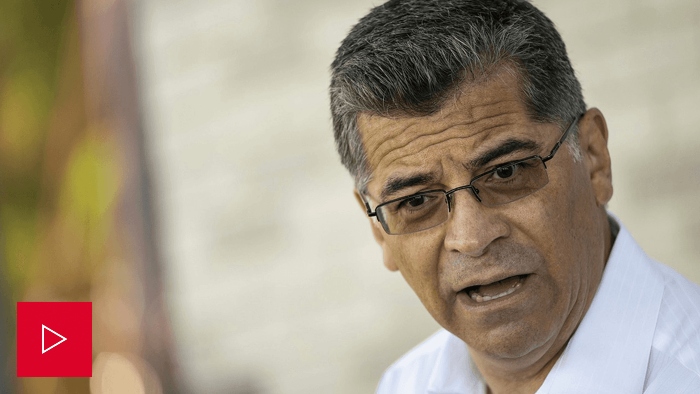You Picked an Organization That Challenges Injustice
It’s what we do all day, every day. When you come here to “Reader Supported News” and ignore the organization’s funding, that is unfair and it is unjust. We will absolutely challenge that, too.
We must have your help to do this. Right now you are not providing it.
Unfair, unjust.
Marc Ash
Founder, Reader Supported News
If you would prefer to send a check:
Reader Supported News
PO Box 2043 / Citrus Heights, CA 95611
Follow us on facebook and twitter!
Live on the homepage now!
Reader Supported News
 o far, most of the Biden presidency has been predictable. Its foreign policy includes bloated Pentagon spending and timeworn declarations that the United States should again “lead the world” and “sit at the head of the table.” Many corporate influence peddlers have settled into jobs in upper reaches of the executive branch. The new administration has taken only baby steps toward student debt relief or progressive taxation. On health care, the White House keeps protecting the interests of insurance companies while rebuffing public opinion that favors Medicare for All.
o far, most of the Biden presidency has been predictable. Its foreign policy includes bloated Pentagon spending and timeworn declarations that the United States should again “lead the world” and “sit at the head of the table.” Many corporate influence peddlers have settled into jobs in upper reaches of the executive branch. The new administration has taken only baby steps toward student debt relief or progressive taxation. On health care, the White House keeps protecting the interests of insurance companies while rebuffing public opinion that favors Medicare for All.
And yet – Joe Biden is no longer on the narrow corporate road that he traveled during five decades in politics.
President Biden’s recent moves to curtail monopolies have stunned many observers who – extrapolating from his 36-year record in the Senate – logically assumed he would do little to challenge corporate power. Overall, Biden has moved leftward on economic policies, while Sen. Bernie Sanders – who says that “the Biden of today is not what I or others would have expected” decades ago – has gained major clout that extends into the Oval Office.
This month has seen a spate of news stories about Sanders’ new political leverage, not only as chair of the Senate Budget Committee but also due to his close working relationship with Biden. Under the headline “Vermont’s Longtime Outsider Has Become a Trusted Voice in the Biden White House,” CNN summed up: “The Biden-Sanders connection is not a love story; it’s more a marriage of convenience. But as Biden pushes an unprecedented progressive White House agenda, it’s crucial.” Sanders told the network that Biden “wants to be a champion of working families, and I admire that and respect that.”
But if Biden is pushing “an unprecedented progressive White House agenda,” it’s a high jump over a low bar. Leaving aside President Lyndon Johnson’s short-lived Great Society program that was smothered by Vietnam War spending, no White House agendas since the 1940s really merit the term “progressive.” And the current president hardly passes as “a champion of working families” unless he’s graded on an unduly lenient curve.
One danger of Bernie’s tight political embrace of Biden is that “progressive” standards will be redefined downward. Another danger is that Biden’s international policies and conformity to militarism will be further swept off the table of public debate.
For instance, targeting Venezuela, Iran, Cuba and other disfavored nations, Biden continues to impose sanctions that are killing many thousands of people each month, with children especially vulnerable. A truly progressive president would not do such a thing.
Meanwhile – despite strong efforts by Sanders, some other lawmakers, and many human-rights activists – Biden is still abetting Saudi Arabia’s warfare in Yemen that continues to cause the world’s worst humanitarian disaster. “While he is a welcome change from the incompetence, venality, and cruelty of the Trump administration,” epidemiologist Aisha Jumaan and attorney Charles Pierson wrote days ago, “Biden has continued the Obama and Trump administrations’ support for the Saudi-led war on Yemen.” A truly progressive president would not do such a thing.
And then there’s the enormous U.S. military budget, already bloated during the Trump years, which Biden has opted to raise. A truly progressive president would not do such a thing.
There is political and moral peril ahead to the extent that Bernie Sanders – or others who oppose such policies – feel compelled to tamp down denunciations of them in hopes of reaping progressive results by bonding, and not polarizing, with Biden.
In the aftermath of his two presidential campaigns that achieved huge political paradigm shifts, Sanders is now in a unique position. “Sanders already influenced a leftward shift in the Democratic Party through his time on the campaign trail in 2016 and 2020,” Bloomberg News reported last week. “Biden has embraced a series of progressive priorities, including an expanded child tax credit and subsidies for clean energy, and made an attempt at increasing the national minimum wage earlier this year.”
Sanders routinely combines his zeal for the art of the morally imperative with the art of the possible. So, four months ago, he helped push the American Rescue Plan through the Senate and onto Biden’s desk for signing. It resulted in upwards of 160 million direct cash payments to individuals, but did not boost the minimum wage. Sanders commented: “Was it everything we wanted? No. Was it a major step for the working class of this country. You bet it was.”
His approach has been similar this week in the midst of negotiations for a multitrillion-dollar budget plan. After a private White House meeting with Biden that Sanders called a “very good discussion,” the senator told reporters: “He knows and I know that we’re seeing an economy where the very, very rich are getting richer while working families are struggling.”
For genuine progressives, the Sanders-Biden bond is positive to the extent that it helps sway the president’s policies leftward – but negative to the extent that it restrains Sanders, and others in his extended orbit, from publicly confronting Biden about policies that are antithetical to the values that the Bernie 2020 presidential campaign embodied. Today, Sanders’ role is appreciably and necessarily different from the needed roles of grassroots movements that have inspired and been inspired by him.
Progressives cannot and should not be satisfied with the policies of the Biden presidency. Yet breakthrough achievements should not be denied.
At the end of last week, Public Citizen’s president Robert Weissman sent out a mass email hailing big news about Biden’s executive order on monopolies. Noting that Biden “tasked agencies throughout his administration with helping to level the playing field for consumers, workers, and small businesses,” Weissman declared: “Joe Biden just took the most significant action any president has taken in generations to confront the menace of corporate monopolies.”
An exaggeration? Hyperbolic? I wondered. So, I asked a leading progressive economist, Dean Baker.
“I think the enthusiasm is warranted,” Baker replied. “Biden laid out pretty much everything that he could do in terms of executive action. In many cases, everything will depend on the implementation, and also what the courts will buy.” The executive order’s provisions will be legally contested. “But some of these items are a really big deal. In the case of imported prescription drugs, you could easily be talking about [saving] $100 billion a year and if they push hard, possibly as much as $200 billion a year. That comes to more than $600 per person every year.”
Baker added that Biden’s recent appointment of Lina Kahn to be the chair of the Federal Trade Commission “was a really big deal – she is probably the foremost progressive anti-trust scholar in the country.”
Overall, what the Biden administration is doing runs the gamut from very good to very awful. Meanwhile, Bernie Sanders – an extraordinary politician who has always worked in tandem with progressive movements – has landed in an exceptional position to shape history. He recently told an interviewer, “As somebody who wrote a book called ‘Outsider in the House,’ yes, it is a strange experience to be having that kind of influence that we have now.”
As Bernie Sanders continues to navigate that “strange experience,” one of the realms where he excels is public communication. It was aptly summarized a few days ago by Nathan J. Robinson, who wrote that Sanders “is always on message, always trying to make sure the press has to talk about what he wants them to talk about…. Bernie has his flaws and made serious mistakes in both of his presidential campaigns, but he is very good at politics despite his marginal position. If he goes on a talk show, he will be discussing wealth inequality or the future of democracy… Staying relentlessly on message – and thinking about what topics we want to spend our finite resources and time talking about – is critical to having an effective, persuasive left.”
An effective, persuasive left cannot be sustained by any leader, no matter how inspiring or brilliant. With the future at stake, what’s ultimately possible – as the Bernie 2020 motto insisted – is not about him, it’s about us.
Norman Solomon is the national director of RootsAction.org and the author of many books, including War Made Easy: How Presidents and Pundits Keep Spinning Us to Death. He was a Bernie Sanders delegate from California to the 2016 and 2020 Democratic National Conventions. Solomon is the founder and executive director of the Institute for Public Accuracy.
Reader Supported News is the Publication of Origin for this work. Permission to republish is freely granted with credit and a link back to Reader Supported News.
Follow us on facebook and twitter!
PO Box 2043 / Citrus Heights, CA 95611





